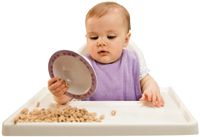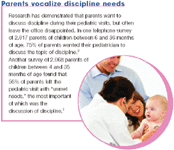Parent discipline techniques for the 9-month-old child
In teaching discipline techniques to parents, it is important for pediatricians to emphasize the value of setting limits and saying "no."

This series will provide pediatricians with age-appropriate teaching tools that can be easily described to parents within the context of a well-child visit. Parents will leave your office knowing it is vital for them to take the leadership role in their families, with the necessary discipline techniques to do so.
Appropriate role of parents
The AAP "Guidance for Effective Discipline" states, "For discipline techniques to be the most effective, they must occur in the context of a relationship in which children feel loved and secure. In this context, parents' responses to children's behavior, whether approving or disapproving, are likely to have the greatest effect be cause the parents' approval is important to the children."1
Most child psychologists agree that children develop best when parents also provide consistent limits and act as the authority figure in the child's life. The way the child responds to parental authority will often predict how the child will respond to authority in all other arenas of life-at school, at work, and in society. Unfortunately, too many parents do not understand the necessity of becoming the moral compass and authority for their children. This is often manifested early in the child's life, when the parents are hesitant to tell their children "no." Parents have asked me if their child will feel "abandoned" or rejected if the child is placed in time out. Other parents have been afraid that their children's creativity and exploration will be stifled if they use the word "no."
Setting limits, however, is important as noted in the AAP statement, "...parents will need to provide behavioral limits that their children will not like."1 Too many parents today believe that it is their responsibility to make their children happy, but in reality it is the parents' role to instill positive character traits in their children so that they will grow up to be self-controlled, self-sufficient, caring adults.
